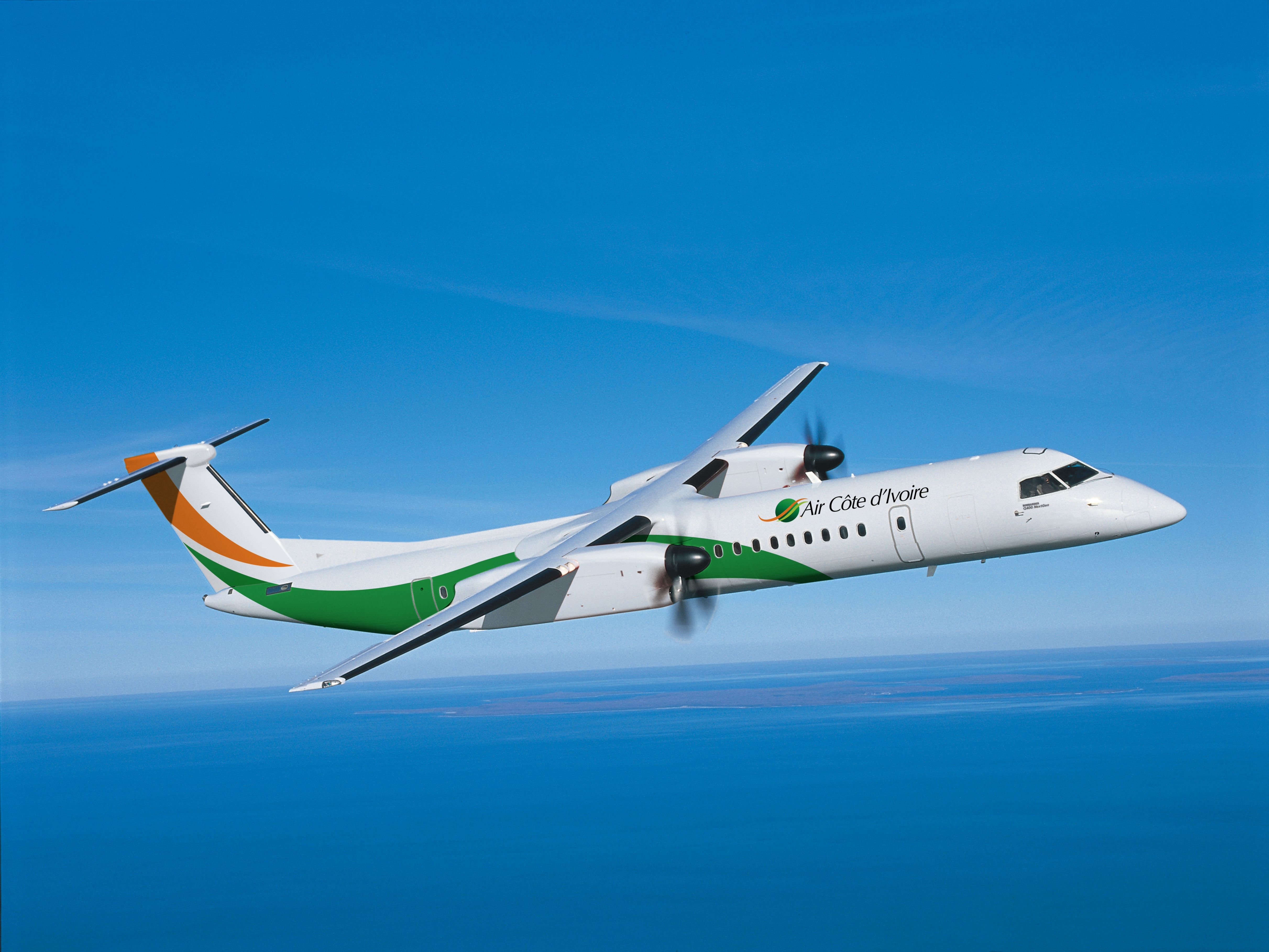
A de Havilland Dash 8-Q400 belonging to Air Côte d’Ivoire made an emergency landing in Abidjan on Saturday evening after its nose gear failed to extend. The pilots alerted air traffic control at Abidjan’s Felix Houphouët-Boigny Airport of possible problems after seeing no indication the nose gear was down and locked. In a nice piece of flying, the pilots brought the plane safely down to land using only its main gear wheels.
Air Côte d’Ivoire lands safely on its nose after the nose wheel fails to deploy
According to a statement issued by Air Côte d’Ivoire, the nearly eight-year-old Dash 8-Q400 (registration TU-TSK) was flying a scheduled passenger service (HF45) between Korhogo(HGO) and Abidjan (ABJ). Local media are reporting the pilots worked through the checklists before landing, including attempting to extend and lock in the nose gear manually.
“On Saturday, July 09, 2022, an Air Côte d’Ivoire plane, registered TU TSK from Korhogo and Bouaké, made an emergency landing at 7:15 p.m. at Felix Houphouët-Boigny airport in Abidjan due to a malfunction of its front landing gear,” says a statement on Air Côte d’Ivoire’s website. “Thanks to the professionalism of the pilots, no injury was recorded among the passengers and the crew onboard.” The airline has not confirmed how many passengers and crew were on the plane.
Atterrissage raté d’un avion de la compagnie Air Côte d’Ivoire. Aucune victime. pic.twitter.com/iwg8eKPCPj
— Alain Flavien Kassi TANOKAN (@AlainTanokan) July 10, 2022
Ivory Coast Government Minister praises pilots and emergency responders
Images posted on social media show the de Havilland coming to a stop on the runway using its main gear and nose. As a result, the airport’s only runway was closed until early on Sunday morning. Inbound flights were diverted to nearby Accra (ACC), while outbound aircraft already on the apron in Abidjan experienced delays until the runway reopened.
In the wake of the incident, Ivory Coast Transport Minister Amadou Koné visited the scene and publicly praised the pilots and attending emergency crews.” From the testimonies that have reached us, both from passengers onboard the flight and from experts in the field, it appears that the pilots and their collaborators have demonstrated professionalism, composure, and good mastery of the procedures in such situations,” the Minister said in a statement on Sunday. “The same goes for the ground services, which have done everything possible to provide the necessary assistance to passengers and ensure their care.”
NEWS : Un avion de la compagnie Air Côte d’ivoire a raté son atterrissage et évité un crash dans la nuit samedi 09 juillet à l’aéroport Félix Houphouet Boigny à Abidjan après qu’une de ses roues se soit bloquée.
Fort heureusement aucun mort ni blessé n’a été enregistré pic.twitter.com/824scUVnOS
— Laura Dave Média (@LauraDaveMedia) July 10, 2022
A solid Air Côte d’Ivoire safety record
Rising from the financial ashes of Air Ivorie in 2012, Air Côte d’Ivoire is jointly owned by the Ivory Coast Government, Air France, and Aérienne de Participation-Côte d’Ivoire. The airline operates nine aircraft around West Africa, including five narrowbody Airbus jets and four de Havilland Q400s. To date, Air Côte d’Ivoire has avoided any serious incidents since 2012. Saturday’s nose gear failure is also the first recorded incident against TU-TSK. The plane was originally bound for Nigeria’s Arik Air but not taken up. TU-TSK went to Air Côte d’Ivoire in November 2014. There is no word on whether the aircraft can be repaired or will be written off.
Investigations by the Ivory Coast’s Accident Investigation Bureau (BEA) are underway to determine the cause of the incident. The airline apologized in its statement for any inconvenience caused. Air Côte d’Ivoire also moved to reassure its customers that it is doing everything possible to guarantee the safety of its flights and abide by international standards.



